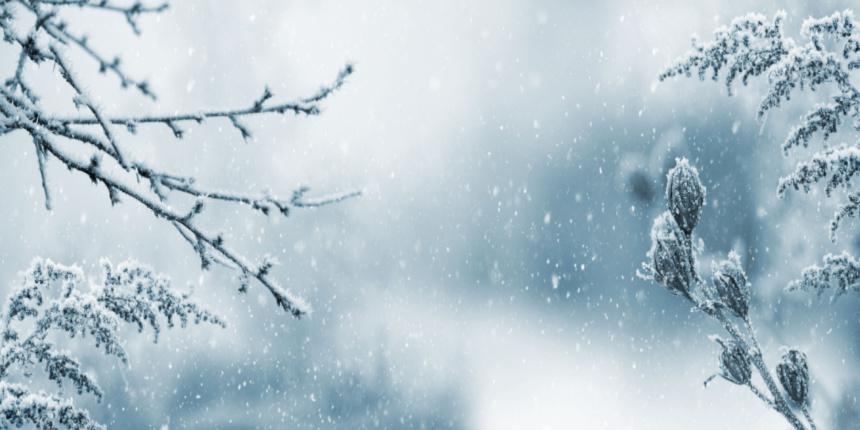Winter Season Essay
The coldest season of the year is winter. In India, it typically lasts from December to February for around three months. Nevertheless, the temperature fluctuates across the nation, with some regions experiencing the coldest and warmest winters.

100 Words Essay On Winter Season
In India, winter is a freezing time of year. It begins following the autumnal equinox and ends with the arrival of the spring equinox. Compared to the other seasons of the year, the winter season causes significant changes in the atmosphere. The atmosphere gets extremely chilly, and cold winds blow quickly. The day becomes short. The night grows long. Sometimes the sky is covered in thick clouds that prevent us from seeing the sun, yet the sky is incredibly bright and beautiful on other winter days. The air gets extremely dry but dusty. Wintertime sunlight becomes soft and light-warm and feels good on the skin.
200 Words Essay On Winter Season
Winter Season In India
India's winter season typically lasts from December through February. The Himalayas have the lowest temperature in India during the winter relative to other regions. The southern Himalayan region experiences snowfall and chilly rain, which generates cold waves that spread into the plains and bring the temperature to chilling levels.
This only happens for a few days despite occasionally dropping below zero degrees. Many areas of northern and central India do not get snowfall, even during the worst winter months. However, fog is the most frequent weather nationwide during the winter months. It occasionally interferes with daily living and restricts the mobility of services.
Additionally, the southern states of India, such as Maharashtra, Tamil Nadu, and Karnataka, experience moderate wintertime temperatures as opposed to the northern ones, which experience significantly colder temperatures.
Challenges Of Winter Season
Not everyone enjoys the winter season. For all the stray animals, people living in hilly locations, and homeless people, the season causes significant difficulty. During this period, several areas of our country (particularly the mountainous ones) get daily snowfall or rain. Since the routes become impassable owing to snowfall or dense fog, it makes it difficult for people living there to survive.
500 Words Essay On Winter Season
The coldest time of the year is winter. The average wintertime temperature is typically below 10°C, with some locations and periods experiencing temperatures as low as 5°C or even 0°C.
Importance Of Winter Season
Winter is typically when the monsoon has subsided, the water sources are abundant, and the weather is ideal for going on adventures. With their families, people enjoy pleasant weather by celebrating holidays like Christmas and New Year's. During this period, many people take holidays and travel to popular tourist locations like Shimla, Manali, and Leh, among others. The weather is generally lovely with many regions of the country receiving moderate to heavy rainfall. However, the winter season is not without its problems, such as pollution, fog, extreme weather conditions.
The winter season has seen a substantial increase in pollution levels in Delhi, which is primarily because of the depression columns that have formed around the region where Delhi is physically located. These issues need to be resolved for people to appreciate the calm environment and take full advantage of it during the winter.
Advantages Of Winter Season
We shall go over a few of the winter season's benefits below:
No sweating in the sun:- Winter brings a much lower and more pleasant daytime temperature. While it frequently becomes too cool to be outside comfortably, there is never a harsh sun to contend with, so as long as you are dressed warmly, you can enjoy the weather.
Saving energy for the hot summer months:- Wintertime brings shorter days and longer nights. This shortens our workdays and enables us to conserve energy to survive the winter and gain the strength we need to endure the summer.
Favourable to Animals and Plants:- Some plants, such as calendula, hollyhock, etc., are particularly suited to the shorter days, less sunlight, and chilly temperatures of the winter. The season helps plants grow by enhancing their metabolism. Many animals and reptiles hibernate during the winter to conserve energy for the summer. Examples include bears and snakes.
My Favourite Season Winter
Winters are my favourite season. There are many nutritious fruits and veggies available in the session. People can enjoy fresh grapes, apples, carrots, cauliflower, guava, and other fruits and vegetables. Additionally, this time of year is when many gorgeous flowers emerge. Roses, dahlias, and other flowers are among them.
This enhances the beauty of winter, which is already lovely. Apart from that, no lizards are visible because they are hibernating. This allows me to live fearlessly and makes me very happy. Most significantly, the most admirable aspect of this season is the mornings. In the winter, I enjoy waking up early to see the dew on the blossoms. Wintertime has an entirely different atmosphere.
Despite how unpleasant it may be, winter offers its benefits. For the following summer months, when we will be working effectively and efficiently, it will allow us to conserve our energy. Even though the season has some drawbacks, its benefits are more significant and apparent.
Applications for Admissions are open.
As per latest syllabus. Physics formulas, equations, & laws of class 11 & 12th chapters
JEE Main Important Chemistry formulas
Get nowAs per latest syllabus. Chemistry formulas, equations, & laws of class 11 & 12th chapters
JEE Main high scoring chapters and topics
Get nowAs per latest 2024 syllabus. Study 40% syllabus and score upto 100% marks in JEE
JEE Main Important Mathematics Formulas
Get nowAs per latest syllabus. Maths formulas, equations, & theorems of class 11 & 12th chapters
